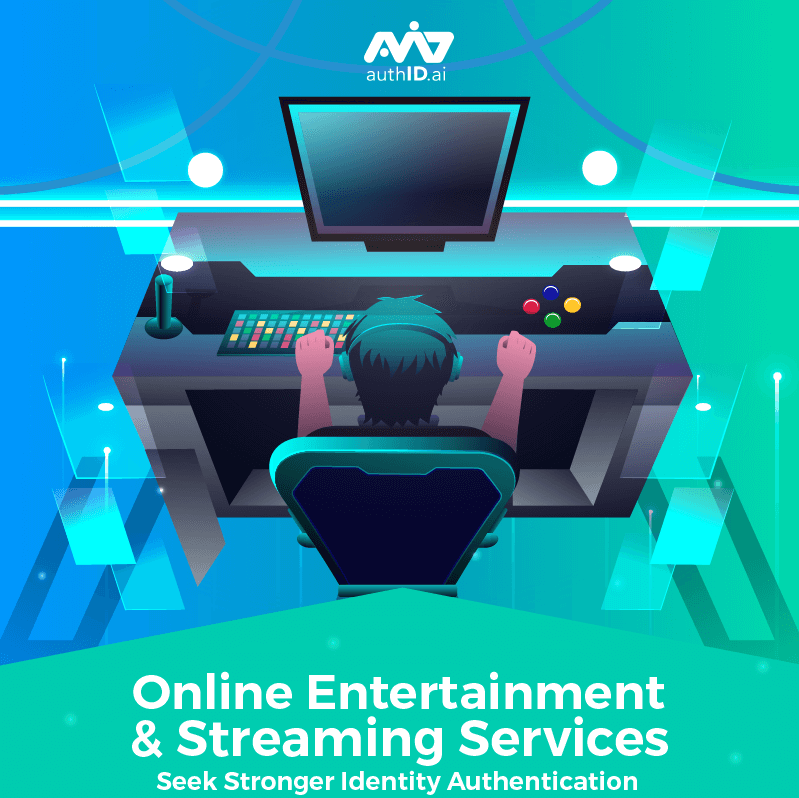Video and audio streaming platforms have been on the rise since before the COVID-19 outbreak. They enable legal access to various media content with greater viewer convenience. Similarly, the online gaming industry has increased its user base, especially with the increasing popularity of mobile versions of computer games.
Since cinemas, theaters, casinos, and gaming arcades paused operations or opened with limited capacity due to the global health crisis, the number of online entertainment platform users has surged drastically. This increase in users has opened new security and loss of revenue concerns among providers, prompting them to seek stronger identity authentication of users to curtail increases in unauthorized shared account activity as well as malicious fraud and account takeover.
Many providers still rely on conventional identity verification methods, leaving their networks vulnerable to fraudulent attacks. Subsequently, online entertainment sites must deploy necessary security measures to protect their networks and ensure that only legitimate users can access their services, particularly if the site imposes age restrictions.
Entertainment in the Digital Space
According to PwC, subscription video-on-demand (SVOD) revenue will more than double box office revenue in 2024.
Additionally, Deloitte’s Digital Media Trends Survey reveals that consumption of free, ad-supported streaming video services has risen by 18% in the US during the pandemic. Furthermore, audio streaming platforms also grew in 2020, with music streaming services and podcasts experiencing a significant increase in popularity and revenue.
The Deloitte survey also indicates that about 48% of American consumers have joined an online gaming venture since the global health crisis started. The online gaming industry was already projected to grow in the coming years, but the COVID-19 pandemic accelerated its growth, increasing sales and boosting user engagement significantly.
However, the continued use of passwords to authorize login and consumption of services by online entertainment providers makes these platforms prone to data breaches and fraud. Some people share their media streaming platform passwords with others to avoid paying subscription fees. Although they trust the person they shared their password with, there is no assurance that someone with more malicious intent will not obtain that password.
Criminals will continue trying to breach data and steal login credentials to use them for illegal purposes. Besides using the real owner’s account, fraudsters can also use their personal information and other relevant details to create fake accounts at other online entertainment platforms. These illicit activities can create dire consequences for digital entertainment providers if they fail to shore up their cybersecurity measures.
Cracking Down Password Sharing on Online Streaming Platforms
In 2019, Parks Associates recorded an estimated $9.1 billion worth of financial losses attributed to account sharing and data piracy in the online streaming industry. They also projected this figure to reach $12.5 billion in 2024.
Among the online streaming industry’s leading providers, Netflix is making a serious attempt to curtail password sharing on its platform. It has commenced trials on its feature that prevents people from using someone else’s account. Should a suspicious login be detected, a message will flash on the screen, suggesting that the viewer create a new account to continue watching if they do not live with the real owner.
This feature then requires the viewer to verify their identity either immediately or at a later time. If they choose the latter, they can keep watching for an indefinite period and later confirm that they are a legitimate account user. The verification procedure is performed via an SMS or email code sent to the “owner” information on file—methods that are not secure and do not guarantee that the rightful account owner confirms their identity.
Effective identity proofing plays a critical role in ensuring only real account owners can use online entertainment platforms. Still, passwords and text-based and email-based authentication are inefficient in proving that the viewer is the real account owner.
Therefore, online entertainment platforms must replace passwords and SMS and email authentication codes with robust login credentials that prevent unauthorized people from accessing accounts. Multi-factor Authentication (MFA) enables a layered defense against fraudsters and ensures that only the real account owner can use the account.
Reducing Password Sharing and Other Cybersecurity Risks with Strong Identity Authentication
Passwordless multi-factor authentication (MFA) provides a robust layered defense against unauthorized logins. It also enables users to confirm their identity seamlessly on online platforms. They can continue streaming their favorite shows or music and log into online gaming sites without the hassle of entering complex passwords and waiting for security codes to be sent over text messages or email.
FIDO2-compliant MFA uses a strong combination of authentication credentials like cryptographic keys, enabling bound identity to a device that can only be unlocked with a secondary factor like facial biometrics.
Users can opt for passwordless login at account registration. During onboarding, the person will undergo a facial biometric identity proofing process with automated identity document authentication to match their facial image to the provided government-issued ID. The procedure also involves an active liveness detection check to ensure the person’s real-time presence. Afterward, FIDO2.0 crypto keys are established, and their trusted identity is tied to the device.
Verified™ by authID leverages mobile technology, anti-spoofing liveness validation, and biometric matching of a selfie to authenticated identity documents to deliver robust identity verification at new account creation. It uses API connections to trusted government registries and provides age verification for age-restricted digital platforms.
authID’s Verified extends the value of a validated identity to enable passwordless login, minimizing friction, and reducing account takeover on online platforms.
Schedule a Demo with authID
authID.ai is a provider of an Identity platform that delivers a suite of secure, mobile, biometric identity solutions, available to any vertical, anywhere. authID‘s products strengthen identity authentication on digital entertainment platforms, keeping out the bad guys and ensuring only legitimate users will be registered and logged in. Contact authID today at 1 (516) 778-5639 or click here to schedule a demo.


